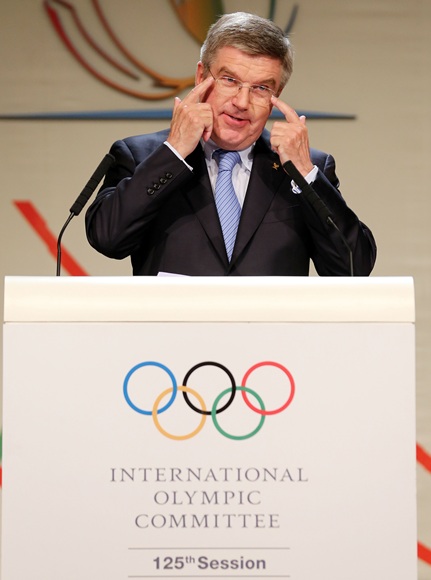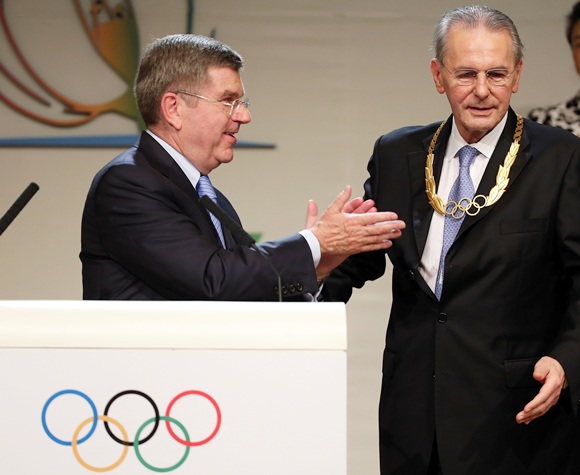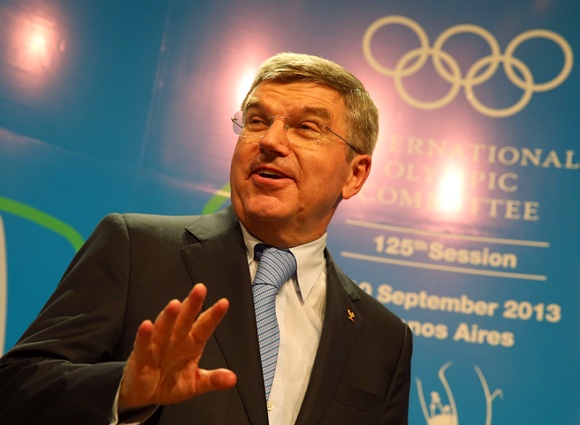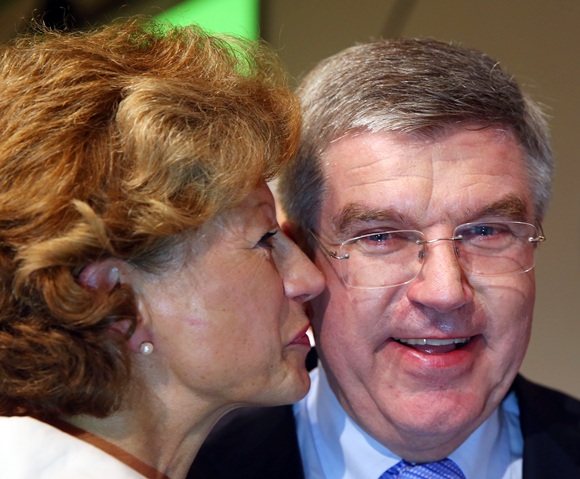 | « Back to article | Print this article |
German Bach claims top IOC post, plans changes to Games
Germany's Thomas Bach was elected president of the International Olympic Committee (IOC) on Tuesday, succeeding Belgian Jacques Rogge and maintaining a European stranglehold on the most powerful position in world sport.
Bach, 59, the first Olympic champion to head the IOC, is the ninth president only in the body's 119-year history and the eighth European IOC leader.
Avery Brundage of the United States was the only outsider to break the monopoly, heading the IOC from 1952-1972.
"I want to be president of all of you," the German beamed as IOC members applauded the decision before hugging and kissing their colleague. "This is a really overwhelming sign of trust and confidence.
"There are really high emotions right now," Bach told international news agencies minutes later.
'I will put sport in the centre of all our attention'
"To feel this great support from all the IOC members is overwhelming. I cannot describe it," said Bach, who had been in tears moments earlier when hugging his wife and close associates.
Asked what his first task was, Bach, who has also worked for sporting goods manufacturer adidas in the 1980s, replied: "The first challenge will be to celebrate. We have the challenge of organising the Sochi Winter Games. We have to prepare well and I am sure they will be great Games."
Bach, who has pledged to reform the structure of the Games and the bidding procedure for the Olympics to attract more candidates, is also eager to boost the number of sports in the world's biggest multi-sports event.
"It is the first time an Olympic champion has been elected IOC president," Bach said. "I will put sport in the centre of all our attention."
Tough start
The first German to run a major international sports body, Bach will have to go straight to work with the Sochi Olympics, starting in February, under international scrutiny over a controversial Russian anti-gay propaganda law.
In addition the 2016 summer Games in Rio de Janeiro are plagued by delays with the IOC eager to see work sped up.
After being feted by his peers, Bach faced tough questions at his first news conference on the Rio and Sochi Games and even his 1970s visits to Argentina which was at the time ruled by a military dictatorship, reminding him he was now in the hot seat.
While he handled the questions with ease, Bach is in no doubt aware that Tuesday's celebrations will soon be a thing of the past.
His first trip will be to ancient Olympia for Sochi's torch lighting ceremony later this month before hoping to "soon" travel to Rio to monitor progress.
"I will never forget this day in my life," Bach told reporters.
'Olympic Movement is in good shape with him at the helm'
Outgoing president Rogge was confident Bach would "do a good job."
"I'm very happy that we will have a very good next president of the IOC and I am glad and proud to be able to hand him over an IOC that is in a good state," he said.
"I wish he will be successful in the challenges he will have to face in the future. He will do a very good job."
Bach, a firm favourite in a choice of six candidates, secured victory in the second round of voting, polling 49 of the available 93 votes and beating Puerto Rican Richard Carrion into second place with 29 votes.
"I thought I had a realistic chance so I went for it," Carrion told reporters. "I gave it my best shot but came up just short.
"Unfortunately there is no silver medals in this competition, now I will have to go on a diet after all those lunches."
Singapore millionaire Ng Ser Miang had been seen by some commentators to be a viable option, but his campaign was derailed by the vote to award Tokyo the 2020 Olympics earlier in the Session.
It would have been unusual for Asia to have benefited twice in two Olympic votes at the same meeting.
"I ran for IOC President because I was concerned by the challenges facing world sport and because I felt I could make a difference," Ng said.
"President Bach shares my concerns, and I know that the Olympic Movement is in good shape with him at the helm.
Bach, long the front-runner for the top job, ticked all the boxes. An Olympic fencing champion at the 1976 Montreal Games, the multi-lingual and affable German was the founding president of his country's Olympic Sports Confederation with some 28 million members.
Kuwaiti support
He also enjoyed crucial support from influential Sheik Ahmad Al-Fahad Al-Sabah, the Kuwaiti who heads the Association of National Olympic Committees and who openly supported his German colleague.
The Sheik, who heads the Olympic Solidarity fund, was believed to have secured key Asian votes for Bach.
He laughed off suggestions that Bach was now in his debt.
"The IOC voted," said the Kuwaiti, who is a former chairman of the oil producer's cartel OPEC. "He doesn't owe me anything."
Congratulations for Bach quickly poured in, including from German Chancellor Angela Merkel.
"I would like to congratulate you very warmly on your election as president of the International Olympic Committee," Merkel said in a statement.
"Your election to this very important sports political body impressively shows the respect and trust you enjoy within the Olympic family.
"I am delighted that Germany will continue to be outstandingly represented on the international level by you."
Sitting on the boards of several companies, Bach is also the chairman of the Ghorfa Arab-German Chamber of Commerce and Industry, and his involvement with the Olympic movement stretches back to the milestone Olympic congress in Baden-Baden where he became a representative of the athletes.
As head of the IOC's juridical commission, Bach has also been at the forefront of sanctioning drugs cheats, in line with Rogge's "zero tolerance" policy.

© Copyright 2025 Reuters Limited. All rights reserved. Republication or redistribution of Reuters content, including by framing or similar means, is expressly prohibited without the prior written consent of Reuters. Reuters shall not be liable for any errors or delays in the content, or for any actions taken in reliance thereon.




